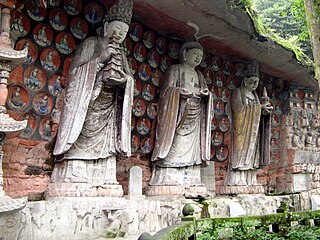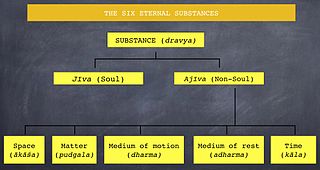
This page lists some links to ancient philosophy, namely philosophical thought extending as far as early post-classical history.

Karma is a concept of action, work or deed, and its effect or consequences. In Indian religions, the term more specifically refers to a principle of cause and effect, often descriptively called the principle of karma, wherein intent and actions of an individual (cause) influence the future of that individual (effect): Good intent and good deeds contribute to good karma and happier rebirths, while bad intent and bad deeds contribute to bad karma and bad rebirths. As per some scripture, there is no link of rebirths with karma. Karma is often misunderstood as fate, destiny, or predetermination.

Sutra in Indian literary traditions refers to an aphorism or a collection of aphorisms in the form of a manual or, more broadly, a condensed manual or text. Sutras are a genre of ancient and medieval Indian texts found in Hinduism, Buddhism and Jainism.

Eastern philosophy or Asian philosophy includes the various philosophies that originated in East and South Asia, including Chinese philosophy, Japanese philosophy, Korean philosophy, and Vietnamese philosophy; which are dominant in East Asia, and Indian philosophy, which are dominant in South Asia, Southeast Asia, Tibet, and Mongolia.
Moksha, also called vimoksha, vimukti, and mukti, is a term in Hinduism, Buddhism, Jainism and Sikhism for various forms of emancipation, enlightenment, liberation, and release. In its soteriological and eschatological senses, it refers to freedom from saṃsāra, the cycle of death and rebirth. In its epistemological and psychological senses, moksha is freedom from ignorance: self-realization, self-actualization and self-knowledge.

Zhu Xi, formerly romanized Chu Hsi, was a Chinese calligrapher, historian, philosopher, poet, and politician during the Song dynasty. Zhu was influential in the development of Neo-Confucianism. He contributed greatly to Chinese philosophy and fundamentally reshaped the Chinese worldview. His works include his editing of and commentaries to the Four Books, his writings on the process of the "investigation of things", and his development of meditation as a method for self-cultivation.

The Huayan school of Buddhism is Mahayana Buddhist tradition that developed in China during the Tang dynasty (618-907). The Huayan worldview is based primarily on the Buddhāvataṃsaka Sūtra as well as on the works of Huayan patriarchs, like Zhiyan (602–668), Fazang (643–712), Chengguan (738–839), Zongmi (780–841) and Li Tongxuan (635–730).

Indian philosophy consists of philosophical traditions of the Indian subcontinent. A traditional Hindu classification divides āstika and nāstika schools of philosophy, depending on one of three alternate criteria: whether it believes the Vedas as a valid source of knowledge; whether the school believes in the premises of Brahman and Atman; and whether the school believes in afterlife and Devas.

Neo-Confucianism is a moral, ethical, and metaphysical Chinese philosophy influenced by Confucianism, which originated with Han Yu (768–824) and Li Ao (772–841) in the Tang dynasty, and became prominent during the Song and Ming dynasties under the formulations of Zhu Xi (1130–1200). After the Mongol conquest of China in the thirteenth century, Chinese scholars and officials restored and preserved neo-Confucianism as a way to safeguard the cultural heritage of China.

Kaṇāda, also known as Ulūka, Kashyapa, Kaṇabhaksha, Kaṇabhuj was an ancient Indian natural scientist and philosopher who founded the Vaisheshika school of Indian philosophy that also represents the earliest Indian physics.
This is a wide-ranging alphabetical list of philosophers from the Eastern traditions of philosophy, with special interest in Indo-Chinese philosophy. The list stops at the year 1950, after which philosophers fall into the category of contemporary philosophy.

Saṃsāra in Buddhism and Hinduism is the beginningless cycle of repeated birth, mundane existence and dying again. Samsara is considered to be dukkha, suffering, and in general unsatisfactory and painful, perpetuated by desire and avidya (ignorance), and the resulting karma.
Jain philosophy or Jaina philosophy refers to the ancient Indian philosophical system of the Jain religion. It comprises all the philosophical investigations and systems of inquiry that developed among the early branches of Jainism in ancient India following the parinirvāṇa of Mahāvīra. One of the main features of Jain philosophy is its dualistic metaphysics, which holds that there are two distinct categories of existence: the living, conscious, or sentient beings (jīva) and the non-living or material entities (ajīva).

Dravya means substance or entity. According to the Jain philosophy, the universe is made up of six eternal substances: sentient beings or souls (jīva), non-sentient substance or matter (pudgala), principle of motion (dharma), the principle of rest (adharma), space (ākāśa) and time (kāla). The latter five are united as the ajiva. As per the Sanskrit etymology, dravya means substances or entity, but it may also mean real or fundamental categories.
Articles related to philosophy of religion include:

Edo Neo-Confucianism, known in Japanese as Shushi-Gaku, refers to the schools of Neo-Confucian philosophy that developed in Japan during the Edo period. Neo-Confucianism reached Japan during the Kamakura period. The philosophy can be characterized as humanistic and rationalistic, with the belief that the universe could be understood through human reason, and that it was up to man to create a harmonious relationship between the universe and the individual. The 17th-century Tokugawa shogunate adopted Neo-Confucianism as the principle of controlling people and Confucian philosophy took hold. Neo-Confucians such as Hayashi Razan and Arai Hakuseki were instrumental in the formulation of Japan's dominant early modern political philosophy.

Religion in the Song dynasty (960–1279) was primarily composed of three institutional religions: Confucianism, Taoism, and Buddhism, in addition to Chinese folk religion. The Song period saw the rise of Zhengyi Taoism as a state sponsored religion and a Confucian response to Taoism and Buddhism in the form of Neo-Confucianism. While Neo-Confucianism was initially treated as a heterodox teaching and proscribed, it later became the mainstream elite philosophy and the state orthodoxy in 1241.
Li Tongxuan (635–730) was a lay Chinese Buddhist scholar and meditation master of the Huayan school.